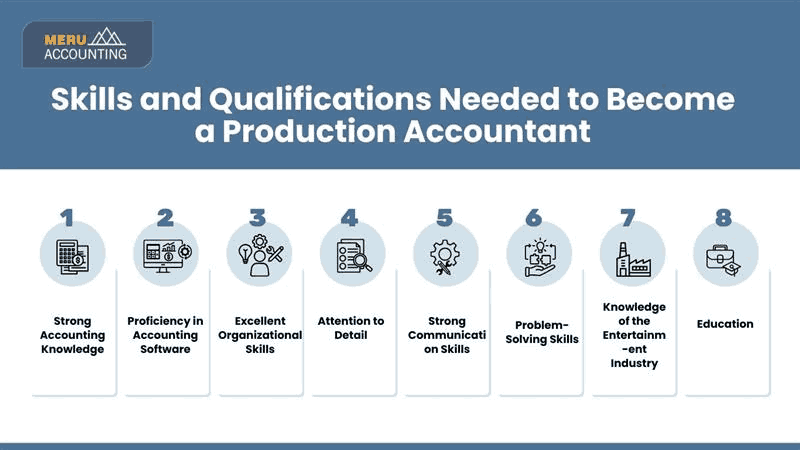Table of Contents

How to Become a Production Accountant
What is Production Accounting?
Production accounting is the specialized field of accounting that deals with the financial management of media productions. This includes everything from budgeting and cost tracking to payroll and tax compliance. Unlike traditional accounting, production accounting is highly dynamic, often involving short-term projects with fluctuating budgets and unique expense categories.
Roles and Responsibilities of a Production Accountant
The role of a production accountant is multifaceted and demanding. Here's a glimpse into their key responsibilities, with added detail:
- Budgeting and Forecasting: Creating and managing the production budget, forecasting potential costs, and identifying areas for cost savings. This involves a detailed analysis of script breakdowns, production schedules, and potential contingencies.
- Cost Tracking and Reporting: Accurately tracking all production expenses, generating detailed cost reports, and providing regular financial updates to producers and other stakeholders. This includes managing cost codes, reconciling expenses against budgets, and providing real-time financial updates.
- Payroll Management: Processing payroll for cast and crew, ensuring compliance with labor laws, and managing union requirements. This involves understanding complex union agreements, managing overtime, and ensuring accurate payment schedules.
- Accounts Payable and Receivable: Handling invoices, payments, and reimbursements, and managing accounts receivable. This includes verifying vendor invoices, processing payments, and resolving any discrepancies.
- Tax Compliance: Ensuring compliance with tax regulations, filing necessary tax forms, and managing tax credits and incentives.
- Financial Auditing: Preparing for and assisting with financial audits, ensuring accuracy and transparency in financial records. This involves maintaining accurate documentation and ensuring all financial transactions are properly recorded.
- Petty Cash Management: Managing petty cash accounts, ensuring proper documentation, and reconciling balances. This requires careful tracking of small expenses and ensuring proper approvals.
Skills and Qualifications Needed to Become a Production Accountant
To excel as a production accountant, you'll need a combination of technical skills and personal attributes, with greater emphasis:
- Strong Accounting Knowledge: A solid understanding of accounting principles, financial reporting, and budgeting. This includes knowledge of GAAP (Generally Accepted Accounting Principles) and financial analysis.
- Proficiency in Accounting Software: Familiarity with production accounting software and general accounting software like QuickBooks or SAP. Mastery of these tools is crucial for efficient financial management.
- Excellent Organizational Skills: The ability to manage multiple tasks, prioritize deadlines, and maintain accurate records. Productions are fast-paced, requiring exceptional organization.
- Attention to Detail: A keen eye for detail and accuracy in financial data and calculations.
- Strong Communication Skills: The ability to communicate effectively with producers, crew members, and vendors. This includes explaining complex financial information clearly and concisely.
- Problem-Solving Skills: The ability to identify and resolve financial discrepancies and challenges. Productions often face unexpected financial hurdles.
- Knowledge of the Entertainment Industry: Understanding the unique financial aspects of film, television, or other media productions. This includes familiarity with union agreements, production schedules, and industry terminology.
- Education: A background in accounting, finance, or a similar discipline is frequently favored.Some employers may also value certifications such as a CPA (Certified Public Accountant).
Steps to Start a Career as a Production Accountant
If you're ready to pursue a career in production accounting, here are some steps to get you started, with added detail:
- Obtain a Relevant Education: Earn a bachelor's degree in accounting, finance, or a related field. To further your expertise, explore advanced degrees or professional credentials.
- Gain Accounting Experience: Work in an entry-level accounting role to gain practical experience and develop your skills. Seek opportunities in industries with similar financial complexities, such as project-based businesses.
- Learn Production Accounting Software: Familiarize yourself with production accounting software and general accounting software. Take online courses, attend workshops, and practice using these tools.
- Network with Industry Professionals: Attend industry events, join professional organizations, and connect with people working in production accounting. Utilize online platforms like LinkedIn to build your network.
- Seek Internship or Entry-Level Opportunities: To gain hands-on experience, look for internships or entry-level positions. These are crucial opportunities in production accounting.
- Build Your Portfolio: Keep track of your projects and accomplishments to showcase your skills and experience. Create a portfolio that highlights your financial management skills and industry knowledge.
- Stay Updated on Industry Trends: Stay updated on production accounting. Follow industry publications and attend workshops. This helps you stay updated with the latest developments. This includes staying updated with changes in tax laws, accounting standards, and technology.
Conclusion
Make sure to carefully plan and analyze the market for better understanding of the profession. Following these steps will help you kickstart your career as a production accountant.
For productions seeking reliable and experienced production accounting services, Accounts Junction offers a comprehensive range of solutions. Our team of skilled professionals has extensive experience in managing the financial aspects of various media productions. We provide accurate and timely financial reporting, ensure compliance with tax regulations, and help productions stay within budget. We understand the unique challenges of the entertainment industry and are committed to providing exceptional service.
FAQs
Q: What is the difference between a production accountant and a traditional accountant?
A: A production accountant manages finances for media projects. These projects often have short-term budgets and unique expenses. A traditional accountant handles ongoing financial tasks for businesses or individuals, often with more stable and predictable financial flows.
Q: What skills are most important for a production accountant?
A: Several skills are crucial for a production accountant. These include strong accounting knowledge, proficiency in software, and excellent organizational skills.
Q: How can I gain experience in production accounting?
A: To start in production accounting, seek internships or entry-level roles and network with professionals. You should also learn the software and consider relevant training.
Q: What are the benefits of using production accounting software?
A: Production accounting software streamlines workflows, maximizes efficiency, provides accurate and real-time financial data, automates tasks, and enhances financial reporting.
Q: Is a degree required to become a production accountant?
A: While not always mandatory, a bachelor's degree in accounting, finance, or a related field is highly preferred. It provides a solid foundation in accounting principles and financial

